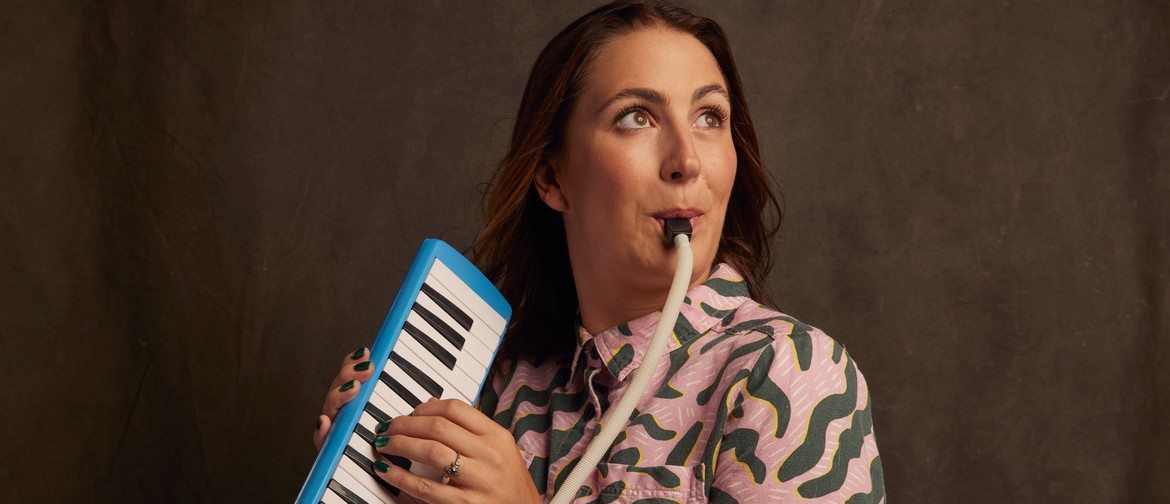After a Festival-wide weather delay, Hayley Sproull’s Ailments opens on Wednesday, 10 May, to a full house. There’s no single demographic to isolate; I’m initially surprised to find myself an outlier on the young end of the audience, but it isn’t shocking, considering the breadth of reach in Sproull’s résumé: the buzz in the air of the Q Theatre Loft settles equally over the crowds of ZM, TVNZ, and dedicated Comedy Festival fans in attendance.
Indeed, the Loft space has morphed into its Comedy Festival form; what was a large, flat performance space with bleachers when I saw She’s Crowning: Rebirth has, it almost seems, slid forward—the bleachers remain, but with several rows of (chock-full) seats in front of them, facing onto a raised stage.
On this stage, left of centre, there’s a light board displaying various x-rays, scans, shots from inside someone’s body—mostly Sproull’s, though she later says, “there are two on here that aren’t me”, and my money’s at least partially on the scissors-through-the-skull incident—as well as several images over which AILMENTS (in all caps) and Hayley Sproull have been superimposed in Courier font. Beside the board is a stool on which various containers of pills are placed, alongside what will later be revealed as a harmonica, complete with neckpiece. There’s a Korg keyboard off to the right. Above the stage, a series of circular lights will shift colour throughout the show, moving with Sproull’s set and her soundtrack.
Sproull is an outstanding performer: natural onstage, charismatic, secure. It can feel a bit hack to praise a performer for their honesty, but Sproull’s candour is precisely what makes Ailments work—she jumps in, openly, frankly, with the perfect degree of both warmth and wit, and as a result, we as viewers feel entirely at ease to jump in with her. It’s no small task for Sproull, where the content of the show is concerned: her list of ailments, though marketed as ‘predominantly minor’, nonetheless involves a transparency not routinely seen on a societal—much less individual, much less public individual—level. But she doesn’t seem daunted. Perhaps that’s one of the masterstrokes of the hour: in expressing perceived vulnerabilities with her whole chest, Sproull neutralises them, and, in doing so, lowers the inhibitions of all in the room.
This is a recipe for, and tool of, laughter, as well as an indicator of precisely what has made her such a sought-after host and presenter in recent years. Indeed, Sproull excels with her crowd work (only minutes in, she’s somehow managed to get people to volunteer information I doubt they would otherwise ever advertise to a crowd of 180), and she’s also clearly practised at keeping proceedings on course. At one point, after demonstrating what a kegel is for one confused front-row boyfriend—wrapping a hand around his finger, mimicking the action, then returning to the stage with an off-hand quip: “we just had sex”—she checks her watch and goes, “this is getting loose!”, but we still end up out safely on time.
“Sproull is an outstanding performer: natural onstage, charismatic, secure.”
As dangled before us with the Korg’s preset appearance, songs are also a crucial facet of Ailments. Sproull makes intermittent use of the keyboard throughout, accompanied on occasion by the harmonica, which sits on a rig around her neck. Said rig, Sproull tells us, cost her $200; following the harmonica’s starring turn, in a song that dips into country and for which Sproull adopts a requisite twang, she gives the verdict: “worth every dollar”. And, yes, there’s a degree of irony in her tone. But, straight up: the Ailments songs are good. Sproull traverses genre with each new track, from the aforementioned country to club bangers to a closing ballad, singing about self-diagnosed ADHD, anxiety, and (mostly) loving her body, actually, because it’s not fair to have spent almost an hour just riffing on its ailments. She plays up the comedy—of course she does, that’s the point—but it doesn’t come at the expense of the songs themselves. These are earworms, and, not for nothing, she’s got great vocal tone. (Ailments EP, maybe?) (Who said that!)
I can’t resist a little bop along in my seat to the beat of the anxiety track (the club banger itself), which is perhaps a bit revealing. But, as I’ve mentioned, this revelatory nature is vital to what makes Ailments such a success: Sproull is so open, unfettered, and essentially—to the extent that a pre-written show can be—unfiltered, that she encourages the same out of her audiences. She creates a space wherein we can settle into our humanness: our otherwise-embarrassing stories, our awkward traits, our ‘predominantly minor’ ailments. And while laughter may not necessarily stand in for medicine in every one of these cases, there is real power in it as a collective experience of acknowledgement and response. Sproull harnesses that brilliantly. In one hour, she catalogues a veritable laundry list of ailments. But she dispenses a significant stock of remedies, too.
Featured photo courtesy of Hayley Sproull and the NZ International Comedy Festival.



